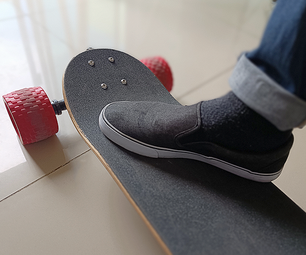Introduction: Survival Backpack Fishing Kit
This Instructable is my take on a Survival Backpack Fishing Kit. My interest in outdoor activities as well as Bushcraft skills has helped me to discover many ideas for carving and other woodworking skills. I always liked the idea of having a small self contained fishing kit to keep in my backpack. There are lots of different designs of backpack fishing kits and this style is the one that meets all my needs. Please allow me to show you how to make a Survival Backpack Fishing Kit like the one that I have made.
Step 1: Tools and Supplies
For this project I chose to use a piece of cherry wood for the main section and scraps of maple burl for the top/lid.
List of Tools and Supplies:
-Small spoon gouge
-Mini spoon scraper
-Flexcut carving knife
-Selection of leather craft stamps
-Wood mallet
-Line snaps and line snap setter with anvil
-Leather hole punch
-Scrap of leather
-Sandpaper 80 grit to 220 grit
-C clamp for gluing and pressing leather craft stamps
-Fishing line and assortment of lures, hooks and tackle
-Waterproof wood glue
-Waterproof epoxy
Step 2: Start Carving and Shaping Cherry Wood Blank. Sanding, Sanding, Sanding.
I decided to have about 2/3 of the project for fishing lure storage and for the section you would hold onto while fishing. 1/3 I left for fishing line storage. I used my Flexcut "Whittling Jack" for roughing out the shape of the line storage section. I used the small spoon gouge to start hollowing out the storage area in the top section of the cherry wood blank. Once the storage area hole was big enough I used the mini spoon scraper tool to remove most of the material. Caution must be used not to over do this part and break through the side of your project. Now is the time to sand the inside of the storage area as well as all of the exterior surfaces of the cherry wood.
Step 3: Assemble and Shape the Lid for a Tight Fit
I used some scraps of maple burl to make the lid for my kit. Using a C-Clamp I glued the pieces of the maple burl together using a waterproof wood glue. I like to just use hand tools as much as possible so I used the Flexcut knife as well as sandpaper. In order to ensure a solid fitting lid I cut a scrap of leather to to fit around the lid and glued it in place. I used a longer length of leather to put through a hole I bored through the lid.This is used as a wrist strap to prevent dropping the kit and losing it in the water.
Step 4: Cut the Leather Fishing Line Protector Piece to Size. Add Snaps and Craft Stamp Impressions.
I had a scrap of leather that I was able to cut to size to use for the wrap that keeps the fishing line organized. Using the leather punch I cut holes for the snaps. To attach the snaps to the leather piece I used the line snap tool with the little anvil. To set the snaps it requires the use of the wooden mallet. Please use safety glasses when using any striking tools, even with leather work. I used leather craft stamps to enhance the look of the line cover. For a small piece of leather like the one in this project use a C-Clamp to apply ample pressure and get a nice clean looking impression. The leather needs to be moistened with water and allowed to dry for a few minutes before stamping in the impressions.
Step 5: Adding a Small Compass to One End of the Fishing Kit
I had on hand a small, good quality compass that I incorporated into this project. To make the recessed hole for the compass I used a 1/2 inch spade bit to carefully drill the opening. Waterproof epoxy was the best choice for keeping the compass in place.
Step 6: Loading the Finished Backpack Fishing Kit With Fishing Line and an Assortment of Lures and Tackle
This is the final step of this project. I put a couple of sinkers, hooks and a small bobber into the storage area. There was just enough room left to put in two small spinning lures as well. My kit was able to hold a full 200 yards of 8 lb fishing line. I did not use any chemical or oil finish to avoid weakening the mono filament line. I am very happy with the way my Survival Backpack Fishing Kit turned out.
This is my very first "Instructable" so I hope everyone likes it and makes their own.

Participated in the
First Time Author









